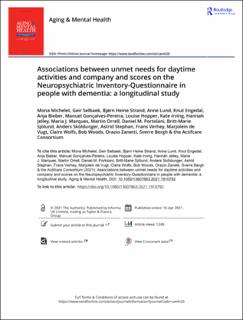Associations between unmet needs for daytime activities and company and scores on the Neuropsychiatric Inventory-Questionnaire in people with dementia: a longitudinal study
| dc.contributor.author | Michelet, Mona | |
| dc.contributor.author | Selbæk, Geir | |
| dc.contributor.author | Strand, Bjørn Heine | |
| dc.contributor.author | Lund, Anne | |
| dc.contributor.author | Engedal, Knut | |
| dc.contributor.author | Bieber, Anja | |
| dc.contributor.author | Gonçalves‐Pereira, Manuel | |
| dc.contributor.author | Hopper, Louise | |
| dc.contributor.author | Irving, Kate | |
| dc.contributor.author | Jelley, Hannah | |
| dc.contributor.author | Marques, Maria J. | |
| dc.contributor.author | Orrell, Martin | |
| dc.contributor.author | Portolani, Daniel M. | |
| dc.contributor.author | Sjölund, Britt-Marie | |
| dc.contributor.author | Sköldunger, Anders | |
| dc.contributor.author | Stephan, Astrid | |
| dc.contributor.author | Verhey, Frans | |
| dc.contributor.author | de Vugt, Marjolein | |
| dc.contributor.author | Wolfs, Claire | |
| dc.contributor.author | Woods, Bob | |
| dc.contributor.author | Zanetti, Orazio | |
| dc.contributor.author | Bergh, Sverre | |
| dc.date.accessioned | 2022-02-09T07:52:24Z | |
| dc.date.available | 2022-02-09T07:52:24Z | |
| dc.date.created | 2021-04-21T11:01:26Z | |
| dc.date.issued | 2021 | |
| dc.identifier.citation | Aging & Mental Health. 2021, 1-10. | |
| dc.identifier.issn | 1360-7863 | |
| dc.identifier.uri | https://hdl.handle.net/11250/2977838 | |
| dc.description.abstract | Objectives: To examine prospectively the association between unmet needs for daytime activities and company and behavioural and psychological symptoms of dementia. Methods: We included 451 people with mild or moderate dementia, from eight European countries, who were assessed three times over 12 months. Unmet needs were measured with the Camberwell Assessment of Need for the Elderly. Three sub-syndromes of the Neuropsychiatric Inventory-Questionnaire were regressed, one-by-one, against unmet needs for daytime activities and company, adjusting for demographic and clinical-functional covariates. Results: Unmet needs for daytime activities were associated with more affective symptoms at baseline, six and twelve months, mean 0.74 (p < 0.001), 0.76 (p < 0.001) and 0.78 (p = 0.001) points higher score respectively, and with more psychotic symptoms at baseline (mean 0.39 points, p = 0.007) and at six months follow-up (mean 0.31 points, p = 0.006). Unmet needs for company were associated with more affective symptoms at baseline, six and twelve months, mean 0.44 (p = 0.033), 0.67 (p < 0.001) and 0.91 (p < 0.001) points higher score respectively, and with more psychotic symptoms at baseline (mean 0.40 points, p = 0.005) and at six months (mean 0.35 points, p = 0.002) follow-up. Conclusion: Interventions to reduce unmet needs for daytime activities and company could reduce affective and psychotic symptoms in people with dementia. | |
| dc.language.iso | eng | |
| dc.relation.uri | https://www.tandfonline.com/doi/epub/10.1080/13607863.2021.1910792?needAccess=true | |
| dc.title | Associations between unmet needs for daytime activities and company and scores on the Neuropsychiatric Inventory-Questionnaire in people with dementia: a longitudinal study | |
| dc.type | Peer reviewed | |
| dc.type | Journal article | |
| dc.description.version | publishedVersion | |
| dc.source.pagenumber | 1-10 | |
| dc.source.journal | Aging & Mental Health | |
| dc.identifier.doi | 10.1080/13607863.2021.1910792 | |
| dc.identifier.cristin | 1905503 | |
| cristin.ispublished | true | |
| cristin.fulltext | original | |
| cristin.qualitycode | 1 |
Files in this item
This item appears in the following Collection(s)
-
Artikler [5061]
-
Publikasjoner fra CRIStin FHI [7536]
